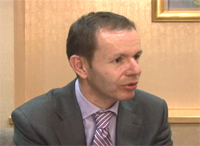Videos
Archives
While some foreign-affiliated companies based in Japan feel uncertainty over doing business in the country following the Great East Japan Earthquake, Umicore Japan KK, a Japanese arm of Umicore, one of the world's two largest manufacturers of positive-electrode materials for lithium ion batteries, continues to rate the Japanese market highly. From April 19 to 21, 2011, the company, headquartered in Belgium, held its group board meeting in the city of Kobe. The meeting was held in Kobe for the purpose of demonstrating the group's steadfast commitment to its business plans in Japan, as Umicore Japan is expected to start up operations at the end of April at a new plant in Kobe for the manufacture of positive-electrodes.
JETRO had the opportunity to speak with Mr. Marc Grynberg, CEO of Umicore, who visited Japan on this occasion, and also with Mr. Luc Gellens, President of Umicore Japan KK.
JETRO
What is the attractiveness of the Japanese market for Umicore, and why did you set up a plant in Kobe?
Mr. Grynberg
Japan is a very important market for us as many important technologies are being developed in Japan. Many of the materials that we deal with have a close relation with Japanese technologies. One example is electric vehicles, where Japan is a world leader in the field, with many leading companies based here too. It is crucial for Umicore group as a whole to demonstrate our presence to these leading companies and our existing Japanese customers, and to underline our commitment to the Japanese market. We also believe that it is necessary to locate R&D functions near our existing customers.

JETRO
Has there been any change in the business situation in Japan, prior to and after the Great East Japan Earthquake?
Mr. Grynberg
Unfortunately, there has been a considerable impact. Some of our customers are based in the disaster-stricken region, and they have been greatly affected by the disaster. I sincerely hope that these companies will recover as soon as possible.
The important thing I would like to state here is that Umicore will not change its existing business and investment plans in Japan. We decided to press on with the launch of operations at the Kobe plant (scheduled for the end of April 2011) and our investment plans in other cities according to our initial schedule. In the long-term perspective Japan's economy will undoubtedly recover. When that happens, Umicore must be a fixture in the Japanese market.
Mr. Gellens
(Concerning the reason for maintaining Umicore Japan's headquarter functions in Tokyo following the disaster), we gathered various data including radiation levels to make our judgments as scientific as possible, so as not to overreact to the situation. As a result, we decided to leave our headquarter functions in Tokyo, including our staff.

JETRO
What will be your future strategy for the Japanese market?
Mr. Grynberg
We would like to expand our business into various fields. One of them is providing support for electric vehicles. Umicore has unique technologies in the fields of battery materials, catalysts for cars and recycling of scarce materials. Japan is an emerging market for these fields, and we would like to seek growth in these areas. Umicore is also the world's leading company in recycling of complex materials, so in Japan we are exploring whether we could launch a recycling business, specifically in the field of precious and scarce metals. Currently, one of our strategies is to seek possibilities in the field of catalysts through cooperation with Japanese auto makers and together with our Japanese partner.
We are also identifying business opportunities in Japanese industries where our company's materials may be used; namely, display screens, electric/electronic parts, high-purity glass and solar cells, among others.
Moreover, (as a corporate strategy in the future) expanding business in the fields of electric vehicles, solar cells, recycling and catalysts will be one of the global strategies for Umicore group. This applies to the Japanese market as well. We are identifying future possibilities to grow in these four fields.
JETRO
What is your message to Japan to overcome the situations following the earthquake and tsunami disaster?
Mr. Grynberg
First of all, I wish to express my sincerest sympathy and deepest compassion to the people who have suffered from the disaster. The reason why Umicore Japan remained in Tokyo following the disaster was because we wanted to do our best for the people in disaster-stricken areas to help their recovery and revival through business activities. The reason I came to Japan from my home country of Belgium in the wake of the great earthquake was to show our unchanged commitment, and business and investment plans for Japan.
Mr. Gellens
I also would like to express my deepest sympathy to the people who suffered due to the disaster. I contacted people connected to our business immediately after the disaster, and found that everyone was aiming for a speedy recovery and seeking to restart business. Our employees also felt the same. Our hope is that Japan will return to its pre-disaster status as soon as possible.
Full version of the interview
Overview of Umicore group
- Umicore is Belgium's leading functional material manufacturer founded in 1837. The company operates business in the fields of secondary battery materials, solar cells, fuel cells, exhaust gas purification catalysts and recycling of precious metals for the global market with over 80 business bases around the globe.
- Umicore is one of the two world's largest producers of positive-electrode materials for lithium ion batteries.
- In April 2011, the company established its Japanese base to produce positive-electrode materials for lithium ion batteries in Kobe. Umicore entered the Japanese market with the assistance of a subsidy provided by the Japanese Ministry of Economy, Trade and Industry as part of "projects promoting the location of job-creating and low-carbon industries", and through support provided by the City of Kobe and JETRO for selecting a location and other matters.




